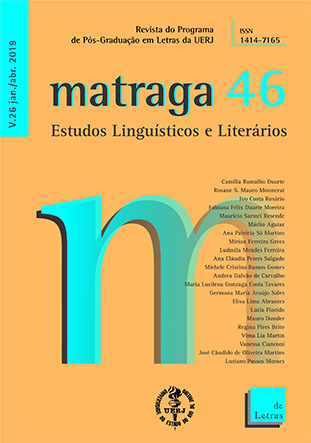Sissy That Talk: a influência dos programas RuPaul Drag Race e Girls in the House no repertório linguístico de adolescentes e jovens adultos
DOI:
https://doi.org/10.12957/matraga.2019.37601Palavras-chave:
Superdiversidade, Repertório Linguístico, Ideologia, Identidade, LGBTTI.Resumo
O primeiro objetivo deste estudo piloto é descrever a influência dos repertórios linguísticos dos reality show estadunidense RuPaul Drag Race, e da websérie brasileira do youtube Girls In The House, no repertório linguístico dos adolescentes, jovens e adultos na comunidade LGBTTI. Para o desenvolvimento deste estudo, foram considerados os aspectos ideológicos e identitários (BAUMAN, 2005; MOITA LOPES, 2002) que permeiam as expressões linguísticas desses grupos. Além disso, ao refletir sobre o atual contexto de superdiversidade (VERTOVEC, 2007), de globalização (KUMARAVADIVELU, 2006) e de contatos linguísticos-culturais muito mais intensos (RYMES, 2010), notamos que o repertório linguístico que nasce dentro de grupos LGBTTIs (e que é disseminado pelos programas) também reconfigura-se em grupos de adolescentes e jovens adultos que se identificam com os aspectos culturais e ideológicos de grupos LGBTTI, sem necessariamente fazerem parte dessa comunidade. Um segundo objetivo deste estudo piloto é descrever e analisar o repertório de adolescentes e jovens adultos, por meio de dados retirados do Facebook, especificamente de postagens do grupo secreto LDRV: Melodrama Era que, atualmente, possui mais de um milhão de membros. Posteriormente, foi realizado um estudo de caso a partir de entrevistas com membros do grupo a fim de descrever e analisar os usos linguísticos adotados pelos indivíduos e relacioná-los ao repertório dos programas de televisão e da comunidade LGBTTIs. Os resultados apontam que as séries funcionam como modelo de uso linguístico para os falantes que, assim, expressam suas ideologias e questões identitárias.
Downloads
Downloads
Publicado
Como Citar
Edição
Seção
Licença
AUTORIZAÇÃO
A Matraga – Revista do Programa de Pós-Graduação em Letras da UERJ está autorizada a publicar o artigo ora submetido, caso seja aceito para publicação online. Fica atestado que a contribuição é original, que não está sendo submetida a outro editor para publicação, e que a presente declaração é a expressão da verdade.
Os trabalhos publicados no espaço virtual da Matraga – Revista do Programa de Pós-Graduação em Letras da UERJ serão automaticamente cedidos, ficando os seus direitos autorais reservados à Matraga. Sua reprodução, total ou parcial, é condicionada à citação dos autores e dos dados da publicação.

A Matraga utiliza uma Licença Creative Commons - Atribuição-NãoComercial 4.0 Internacional.





